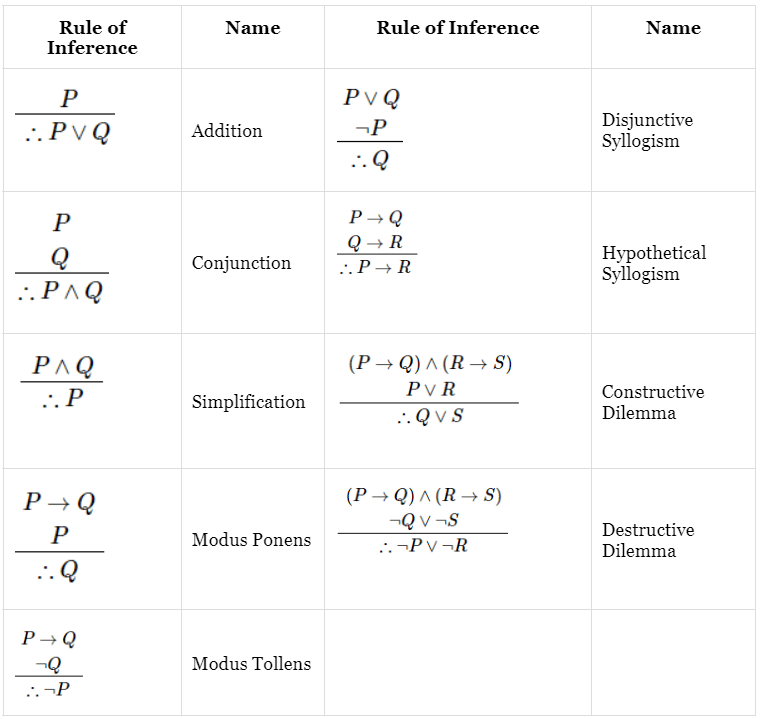Engineering Mathematics Exam > Engineering Mathematics Notes > Engineering Mathematics > Rules of Inference
Rules of Inference | Engineering Mathematics - Engineering Mathematics PDF Download
What are Rules of Inference for?
- Mathematical logic is often used for logical proofs. Proofs are valid arguments that determine the truth values of mathematical statements.
- An argument is a sequence of statements. The last statement is the conclusion and all its preceding statements are called premises (or hypothesis). The symbol “∴”, (read therefore) is placed before the conclusion. A valid argument is one where the conclusion follows from the truth values of the premises.
- Rules of Inference provide the templates or guidelines for constructing valid arguments from the statements that we already have.
Table of Rules of Inference

Addition
- If P is a premise, we can use Addition rule to derive P∨Q.

Example
- Let P be the proposition, “He studies very hard” is true
- Therefore − "Either he studies very hard Or he is a very bad student." Here Q is the proposition “he is a very bad student”.
Conjunction
- If P and Q are two premises, we can use Conjunction rule to derive P∧Q.

Example
- Let P − “He studies very hard”
- Let Q − “He is the best boy in the class”
- Therefore − "He studies very hard and he is the best boy in the class"
Simplification
- If P∧Q is a premise, we can use Simplification rule to derive P.
P∧Q/∴P
Example
- "He studies very hard and he is the best boy in the class", P∧Q
- Therefore − "He studies very hard"
Modus Ponens
- If P and P→Q are two premises, we can use Modus Ponens to derive Q.

Example
- "If you have a password, then you can log on to facebook", P→Q
- "You have a password", P
- Therefore − "You can log on to facebook"
Modus Tollens
- If P→Q and ¬Q are two premises, we can use Modus Tollens to derive ¬P.

Example
- "If you have a password, then you can log on to facebook", P→Q
- "You cannot log on to facebook", ¬Q
- Therefore − "You do not have a password "
Disjunctive Syllogism
- If ¬P and P∨Q are two premises, we can use Disjunctive Syllogism to derive Q.

Example
- "The ice cream is not vanilla flavored", ¬P
- "The ice cream is either vanilla flavored or chocolate flavored", P∨Q
- Therefore − "The ice cream is chocolate flavored”
Hypothetical Syllogism
- If P→Q and Q→R are two premises, we can use Hypothetical Syllogism to derive P→R

Example
- "If it rains, I shall not go to school”, P→Q
- "If I don't go to school, I won't need to do homework", Q→R
- Therefore − "If it rains, I won't need to do homework"
Constructive Dilemma
- If (P → Q) ∧ (R → S) and P ∨ R are two premises, we can use constructive dilemma to derive Q∨S.

Example
- “If it rains, I will take a leave”, (P → Q)
- “If it is hot outside, I will go for a shower”, (R → S)
- “Either it will rain or it is hot outside”, P ∨ R
- Therefore − "I will take a leave or I will go for a shower"
Destructive Dilemma
- If (P → Q) ∧ (R → S) and ¬ Q ∨ ¬ S are two premises, we can use destructive dilemma to derive ¬P∨¬R.

Example
- “If it rains, I will take a leave”, (P → Q)
- “If it is hot outside, I will go for a shower”, (R → S)
- “Either I will not take a leave or I will not go for a shower”, ¬Q ∨ ¬S
- Therefore − "Either it does not rain or it is not hot outside"
The document Rules of Inference | Engineering Mathematics - Engineering Mathematics is a part of the Engineering Mathematics Course Engineering Mathematics.
All you need of Engineering Mathematics at this link: Engineering Mathematics
|
65 videos|129 docs|94 tests
|
Related Searches
















